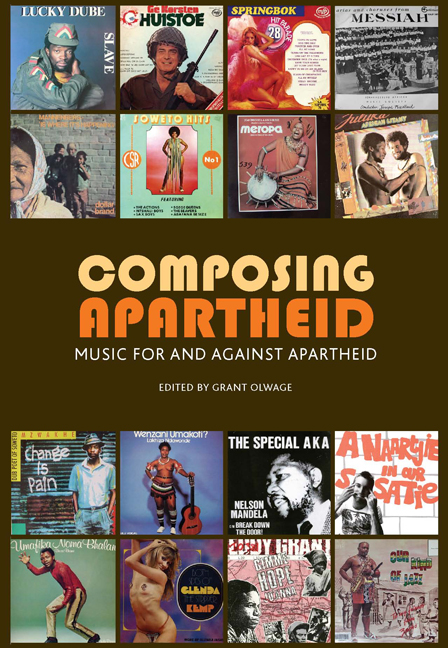Book contents
- Frontmatter
- Dedication
- Contents
- Acknowledgements
- Introduction
- Chapter 1 Back to the Future? Idioms of ‘displaced time’ in South African composition
- Chapter 2 Apartheid's Musical Signs: Reflections on black choralism, modernity and race-ethnicity in the segregation era
- Chapter 3 Discomposing Apartheid's Story: Who owns Handel?
- Chapter 4 Kwela's White Audiences: The politics of pleasure and identification in the early apartheid period
- Chapter 5 Popular Music and Negotiating Whiteness in Apartheid South Africa
- Chapter 6 Packaging Desires: Album covers and the presentation of apartheid
- Chapter 7 Musical Echoes: Composing a past in/for South African jazz
- Chapter 8 Singing Against Apartheid: ANC cultural groups and the international anti-apartheid struggle
- Chapter 9 ‘Nkosi Sikelel' iAfrika’: Stories of an African anthem
- Chapter 10 Whose ‘White Man Sleeps’ Aesthetics? and politics in the early work of Kevin Volans
- Chapter 11 State of Contention: Recomposing apartheid at Pretoria's State Theatre, 1990–1994. A personal recollection
- Chapter 12 Decomposing Apartheid: Things come together
- Chapter 13 Arnold van Wyk's Hands
- Contributors
- Index
Chapter 12 - Decomposing Apartheid: Things come together
Published online by Cambridge University Press: 20 April 2018
- Frontmatter
- Dedication
- Contents
- Acknowledgements
- Introduction
- Chapter 1 Back to the Future? Idioms of ‘displaced time’ in South African composition
- Chapter 2 Apartheid's Musical Signs: Reflections on black choralism, modernity and race-ethnicity in the segregation era
- Chapter 3 Discomposing Apartheid's Story: Who owns Handel?
- Chapter 4 Kwela's White Audiences: The politics of pleasure and identification in the early apartheid period
- Chapter 5 Popular Music and Negotiating Whiteness in Apartheid South Africa
- Chapter 6 Packaging Desires: Album covers and the presentation of apartheid
- Chapter 7 Musical Echoes: Composing a past in/for South African jazz
- Chapter 8 Singing Against Apartheid: ANC cultural groups and the international anti-apartheid struggle
- Chapter 9 ‘Nkosi Sikelel' iAfrika’: Stories of an African anthem
- Chapter 10 Whose ‘White Man Sleeps’ Aesthetics? and politics in the early work of Kevin Volans
- Chapter 11 State of Contention: Recomposing apartheid at Pretoria's State Theatre, 1990–1994. A personal recollection
- Chapter 12 Decomposing Apartheid: Things come together
- Chapter 13 Arnold van Wyk's Hands
- Contributors
- Index
Summary
Musical markers in life histories
Nobody plays Chopin quite like my father does. When I was eight, I believed he was the reincarnation of Chopin. At night I would fall asleep to the sounds of nocturnes, polonaises and etudes being played down the hall. My favourite was the ‘Revolutionary Etude’, Op. 10 No. 12 in C Minor, with the thrilling suspense of its unmistakable opening chord, followed by the spectacular descending cascade of notes as it transitioned into the desperate appassionato melody. A frail Chopin, I was told, had composed this dramatic piece as his contribution to the people's uprising when Russia occupied Poland in 1831. Both the piece and the motivation behind its composition captivated me, not only for the aesthetics of the sound, but also for the intensity of the sentiment that lay within that sound. To this day, it serves as both a nostalgic ‘umbilical chord’ connecting me to the music of my childhood, and as a symbol of my earliest recognition of the power of music in a political context. It was the first of many masterpieces that have presented themselves as musical markers across my lifetime.
Musical markers punctuate people's lives, whether consciously or not. These markers entertain, inform, influence, and instil personal memories that serve as symbols of meaningful demarcations in any life history. For some, associations with music are deepest when related to relationships. For others, they define seminal rites of passage in their lives. For others still, musical markers define cognitive awakenings that alert them to social realities they were previously unaware of. The latter case has the ability to influence thinking subtly or blatantly, drastically change minds, or even dramatically alter worldviews.
So, too, do musical markers punctuate the lives of societies, whether they are individually or collectively conscious of them or not. These markers similarly entertain, inform, influence, and instil cultural memories that preserve cultural attributes, and mobilise change. They reveal relationships within the group, indicate rites of passage within the community, or define affective or intellectual awakenings through pieces that culturally or politically influence or affect the group as a whole. The latter case has the ability to either maintain, or transform, the vision and the workings of their world.
- Type
- Chapter
- Information
- Composing ApartheidMusic for and against apartheid, pp. 255 - 280Publisher: Wits University PressPrint publication year: 2008



